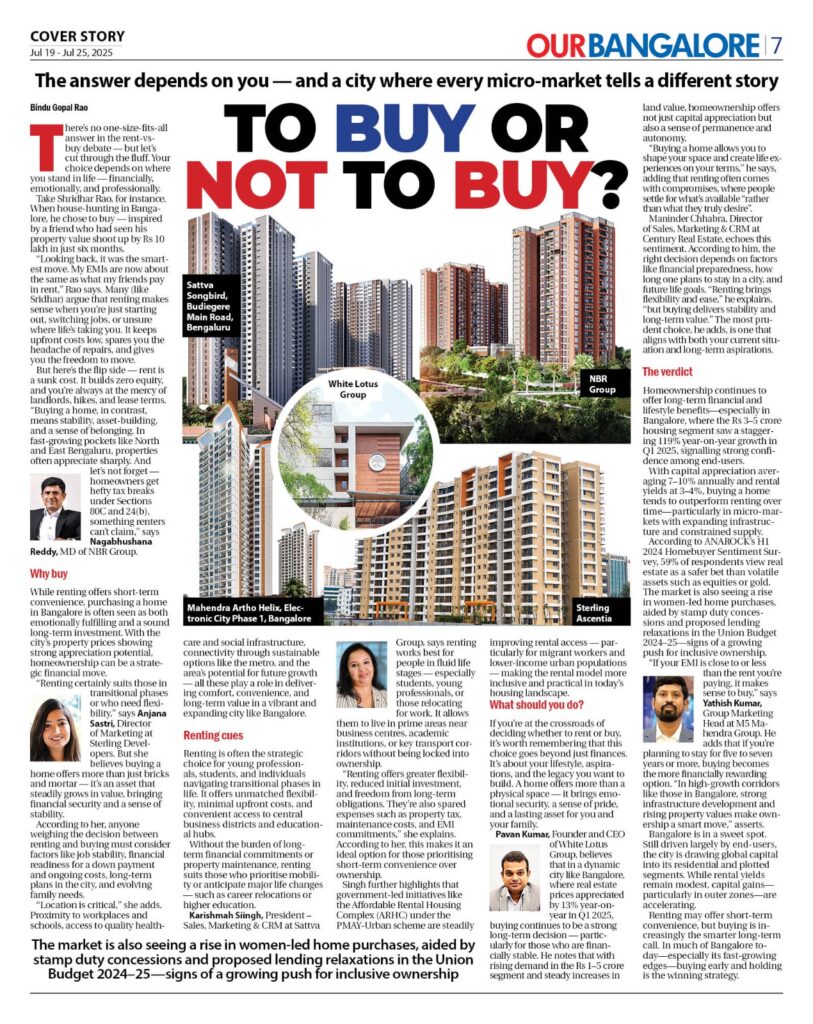
If you’re rooted in the city and ready to commit, buying is not just a smarter financial move, it’s a deeply personal investment in how you choose to live.
A good starting point is asking yourself three key questions:
- Financial readiness – Can you afford the down payment, EMI, and associated costs without stretching your budget uncomfortably?
- Stability of location – Are you planning to stay in the same city for at least 5–7 years?
- Life stage and goals – Are you starting a family, planning long-term roots, or looking to invest in an appreciating asset?
If the answer to these is “yes,” buying may make more sense. Additionally, consider future appreciation potential, rental yields, and lifestyle upgrades that ownership can bring.
Beyond the numbers, buying gives you freedom- freedom to design, to invest meaningfully in your space, and to build emotional permanence. You’re not just occupying a home; you’re shaping one that evolves with your life.
Renting, meanwhile, offers flexibility and lower upfront costs. For individuals in transition like changing careers, exploring geographies, it serves a purpose. It also allows access to premium areas without the long-term commitment of ownership.
But renting comes with trade-offs: rising rents, limited control, and a sense of temporariness. In contrast, ownership especially in a future-forward city like Bengaluru offers not just financial resilience, but psychological security. For those seeking stability, personalization, and long-term value, buying a home is more than a transaction, it’s a declaration of intent.
The decision to buy a home should come from clarity, not urgency. There are three key dimensions we encourage buyers to reflect on:
- Clarity of Commitment – Are you ready to anchor your life in a particular place? Ownership creates value when you’re rooted- emotionally, professionally, and geographically.
- Clarity of Lifestyle – Does the home elevate how you live? In the luxury segment, it’s not just about space, it’s about flow, light, privacy, and how architecture shapes your everyday rhythm.
- Clarity of Intent – Does this acquisition align with your larger wealth and life goals? Luxury homebuying isn’t a stretch, it’s a statement. For many, it’s about creating legacy, permanence, and a sanctuary that reflects their journey.
The rent vs. buy conversation has evolved, especially in the luxury segment. Today, it’s less about ownership as a financial checkbox and more about how people want to live, feel, and belong.
In cities like Bengaluru, there is a new kind of buyer – someone who isn’t just investing in real estate, but in quality of life. They are choosing homes that are not transactional, but transformational. Where architecture supports well-being, where privacy and peace are privileges, and where the home becomes an extension of their identity.
Ownership, in this context, becomes a quiet but powerful form of self-expression. It offers a kind of emotional equity that renting simply can’t match. You don’t just live in the space – you shape it, grow with it, and find continuity in a world that’s constantly shifting.
In a high-growth city like Bangalore, buying a home is often a more financially prudent decision than renting. With monthly rentals rising significantly and initial deposits ranging from 6 to 10 months of rent, tenants are already committing a sizable amount upfront – an amount that could easily serve as a down payment for purchasing a home.
Moreover, ongoing costs such as water charges and maintenance fees add to the rental burden. In contrast, the same monthly outflow can be redirected toward a home loan EMI, building long-term equity instead of contributing to a landlord’s returns.
Real estate in Bangalore has historically shown strong appreciation, thanks to rapid infrastructure development, steady IT/ITES growth, and a thriving cosmopolitan culture. This makes homeownership not just a lifestyle decision, but a sound investment with the potential for significant capital gains over time.
Advantages of Buying:
- Builds Equity & Long-Term Wealth: Every EMI you pay contributes to owning a tangible asset, unlike rent, which is a recurring expense with no returns.
- Stable EMI vs. Rising Rents: While rent tends to increase every year, home loan EMIs remain stable, helping you plan your finances better in the long run.
- Tax Benefits on Home Loans: Homeowners enjoy substantial tax deductions on both principal repayment and interest payments under Sections 80C and 24(b) of the Income Tax Act.
- Freedom to Personalize: Own your space – renovate, modify, or upgrade your home without seeking approvals or restrictions from landlords.
- Asset Appreciation: In high-growth cities like Bangalore, real estate has shown consistent appreciation, making property ownership a reliable and rewarding investment.
Buying a home is a smart long-term decision one that builds equity, provides stability, and offers unmatched value in a growing city like Bangalore. Especially for families looking to settle down, buying is not just about a home it’s about building a legacy.
Kiran Venugopal, CEO and Founder of Bricks and Milestones shares his thoughts:
1. What is better – renting or buying, and why?
In today’s Bangalore context, buying makes stronger financial sense, especially in growth corridors and certain micro markets like Devanahalli, Sarjapur, and the Airport region. Property prices in parts of North Bangalore have appreciated by over 35% in the last three years, and the upcoming Satellite Town Ring Road, proposed expressways, and Metro connectivity will only push that higher. With global institutional investors increasing their stake in Indian residential platforms and significant FDI flowing into Bangalore’s northern and eastern belts, the city is no longer just a place to live. It is a capital growth opportunity. For end-users with a medium-to-long horizon, ownership isn’t just emotional, it’s strategic wealth creation.
Rent, on the other hand, is a recurring cost that builds no long-term value. The math is clear, every month you rent is a month you’re not capitalizing on Bangalore’s robust real estate momentum.
2. What are the advantages of buying over renting?
While renting offers flexibility and lower upfront costs, the advantages of buying in Bangalore far outweigh these temporary conveniences. Renting gives you mobility, but it is not a hedge against the market. In fact, rent inflation in Bangalore, especially around IT hubs, is outpacing salary hikes in some sectors. Buying gives you a stable EMI, tax benefits, and the ability to ride the appreciation curve. Buyers who invested in the Sarjapur–Attibele stretch five years ago are now sitting on capital gains of 50% to 70%. These gains reflect structural shifts driven by infrastructure like the Bengaluru–Chennai Expressway and IT-SEZ spillover.
Yes, renting allows you to move easily and avoid maintenance responsibilities, but you are paying ₹35,000 or more monthly for a 2BHK with zero ownership benefit. In contrast, buying gives you tangible asset appreciation. In Devanahalli, for example, proximity to the international airport has driven property rates to ₹6,000 per square foot. You are not just buying a home, you are securing your financial future in one of India’s most resilient real estate markets. The tax benefits, rental income potential, and long-term wealth creation through buying are incomparable.
In high-growth zones like Devanahalli and Sarjapur, buying a home has delivered annual capital appreciation of 16% to 20%, which far exceeds returns from fixed deposits or rental income. Ownership also brings a long-term asset that builds equity. In Bangalore, the breakeven point where buying becomes more cost-effective than renting can arrive within three to five years, much sooner than in cities like Mumbai or Delhi.
Rental markets saw a sharp rise between 2023 and 2025, with rents jumping 20% to 30% in tech corridors. While some supply has eased the pressure, prime locations still face limited inventory, keeping rents elevated. For buyers, this means EMIs can actually be more stable and predictable than rent.
There is also the matter of control and security. When you own your home, you are not subject to sudden rent hikes or landlord decisions. For those who choose to lease their property, rental yields in several Bangalore micro-markets are now around 4% to 5% annually.
And beyond the financials, owning a home brings emotional and social value — a sense of stability, family security, and belonging to a community. Renting may offer flexibility, but for those who are ready, buying offers both peace of mind and long-term financial upside.
Read the full story that first appeared in Our Bangalore dated July 19-25, 2025 here:
PDF is here:


Leave a Reply